
Summer 2024 ended, seemingly before it got going. Much of Britain has seen temperatures around average with Northern Ireland and northwestern areas of Britain, including the northwestern half of Wales being cooler than average. This pulled down the overall average for the UK. There have been sunny, warm interludes but often northwest Europe was caught in a cooler North Atlantic flow as southeastern Europe stuck with intense heat. Anyone who visited Greece, Italy, the Balkans or Austria in recent months will know where the summer heat has been.
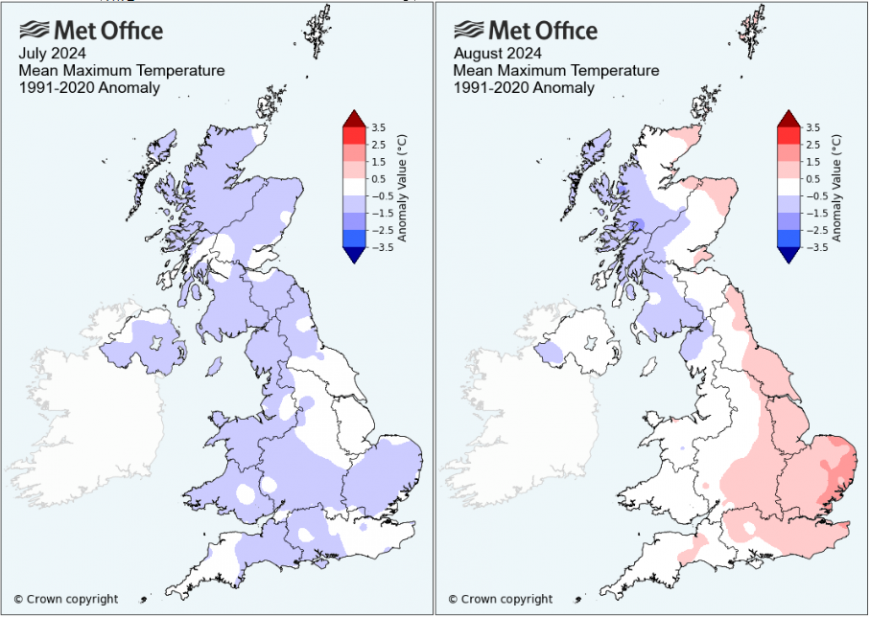
Eastern Britain was warmer than average in August. The top UK temperature was 34.8C in Cambridge on 12th August in a pulse of heat from the continent. Kew Gardens reached 30C at the end of July. (West Sussex saw 30C on the 1st Sept as temperatures across mainland Europe surged upwards on the first day of meteorological autumn). What was missing this summer were episodes of extreme heat leading to drought and heatwave impacts.
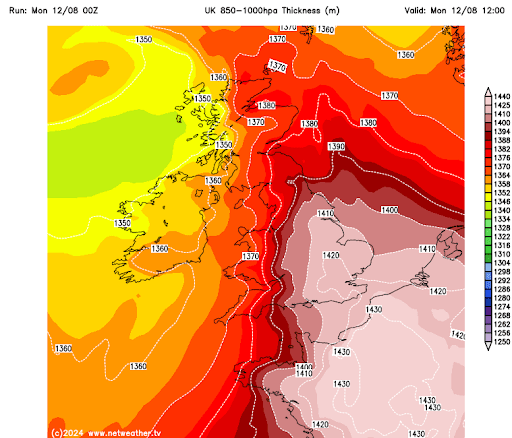
“After below average temperatures for June and July, August 2024 brought slightly above average temperatures for the UK… The southeast (of England) experienced the most frequent warm weather.” Met Office
Storm Lilian arrived on 23rd August hitting the Leeds festival, a summer storm that brought heavy rain and strong winds.
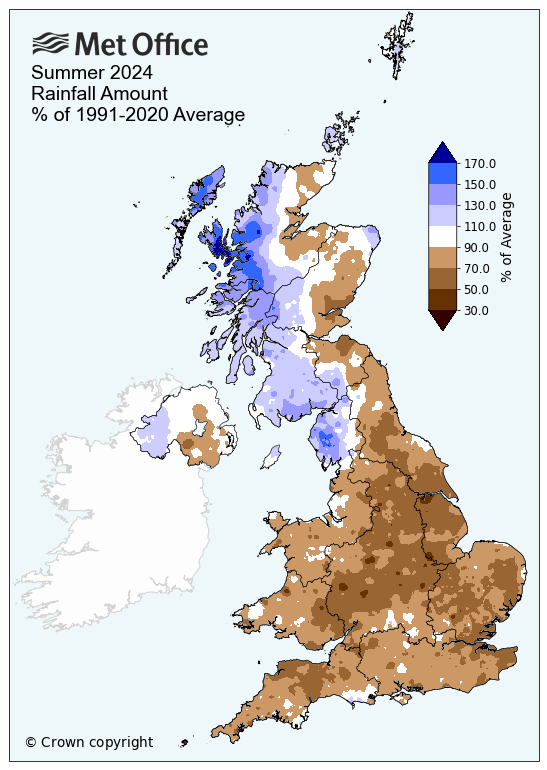
England had a dry summer compared to average. It has been very wet in western Scotland and Cumbria but drier than average for most of the UK. The cool and wet northwestern parts were also rather dull. Other parts of western Britain and northwest Northern Ireland had lower than average sunshine hours whereas pockets of eastern Britain saw slightly more.
The Western Isles had a terrible summer; dull cool and very wet. Stornoway airport saw its 3rd wettest summer in a long series back to 1873 with 334mm of rain. Also its dullest summer on record according to Dr Eddy Graham, University of Highlands & Islands
“Scotland provisionally experienced over one-and-a-half times its average August rainfall (162%), while southern England only recorded half of its monthly average (50%). Some areas of Scotland including Glasgow, Renfrewshire, and Ayrshire and Arran provisionally recorded over double the average August rainfall.” MO
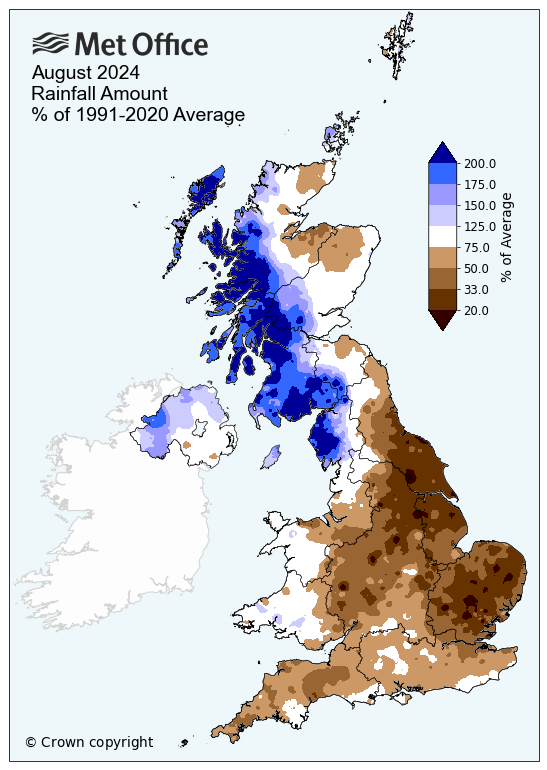
Even with Scotland’s overall wetter than average rainfall, it was the west and southwest that had a soggy month as eastern and northeastern Scotland stayed drier, especially in Moray. SEPA still issued water scarcity alerts during the summer months in the drier areas.
A member of the Netweather community forum had kept note of the SEPA rainfall data for local station, East Kilbride (south of Glasgow) going back to 2010. “August 2024 was the wettest summer month in those 15 years and the 8th wettest overall” The overall mood from those on the west coast was that it had been very wet in August with flooding, and rain nearly every day. These high totals came from numerous days of heavy rain, not torrential downpours in summer thunderstorms.
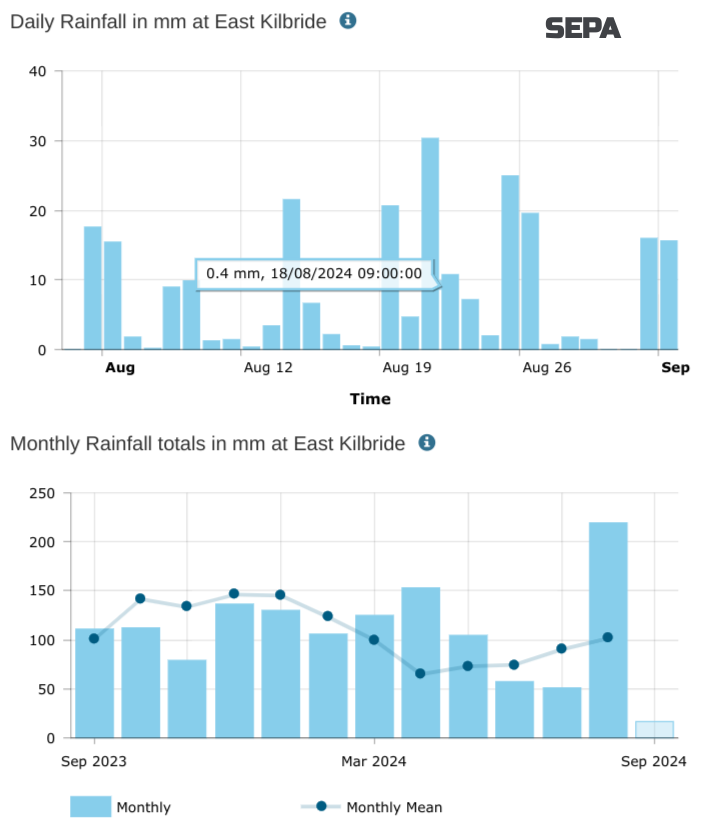
The UK Met Office issue their monthly, seasonal and annual figures as anomaly maps with an accompanying text. The Spring 2024 issue headlined with “Warm May and Spring for the UK” which saw a backlash as public perception focused on a ‘poor’ Spring thinking about all the rain and lack of sunshine. A misunderstanding that Mean temperatures can still be higher than average even with cloudy, damp weather. This season, the one-liner headline is “UK experiences coolest summer since 2015” and the climate deniers are shrieking on TwitterX that it proves global warming isn't real. Perhaps these one sentence headlines are not really helping explain what has occurred. UK-wide statistics are tricky to condense and the lack of understanding of long-term trends and statistics can at times be painful to witness.
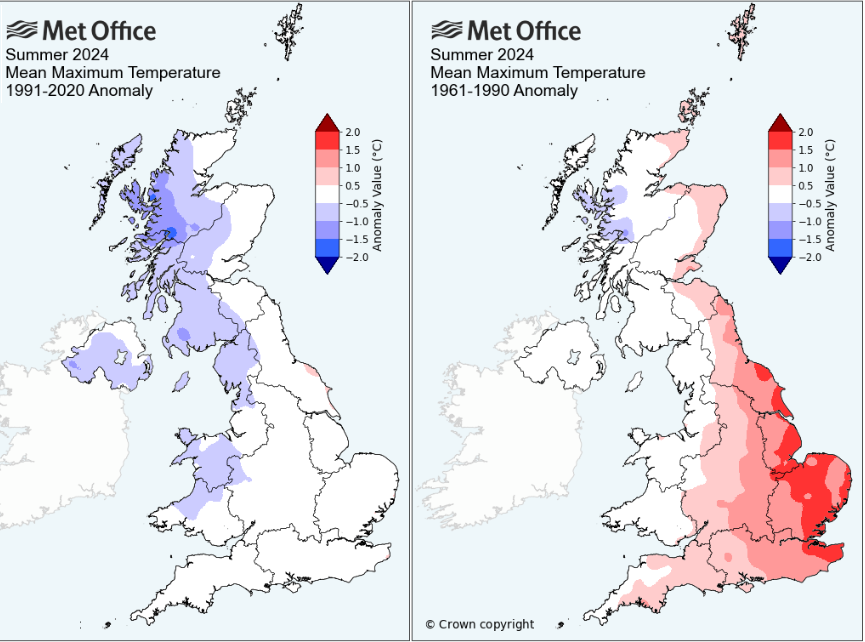
Our climate is warming and the averages are updated each decade to reflect that. Comparing to the previous 30-year average [above], it was warmer than average in the east. Modern era heating is pushing the recent averages way higher. Summer 2024 in northwest Britain only appears cooler, compared to recent warm years. Other parts of Europe saw a very different story.
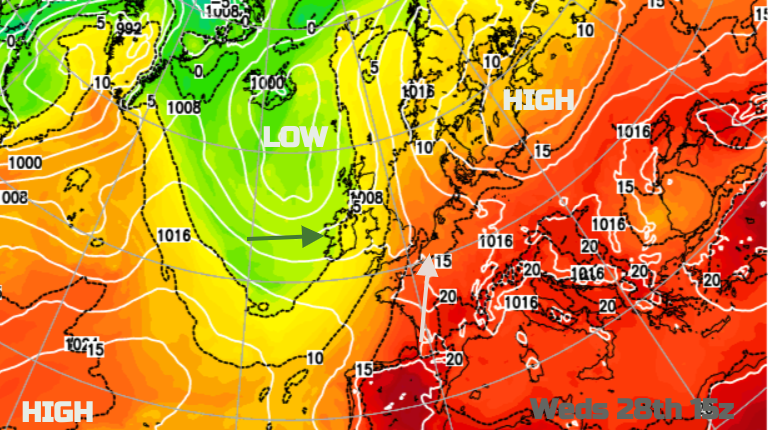
Europe
It was the 2nd hottest August after 2003, since records began in 1864 in Switzerland. Austria had its warmest August and 2nd warmest summer on record. The Greek islands were hot with temperatures well into the 30sC. Athens was hot, especially July 2023 with an average July 2023 temperature of 31.3 °C for the station of Thiseio with records back to 1860. Heatwave warnings appeared in each of the summer months.
The Arctic
In the Arctic circle, Longyearbyen saw its warmest month ever recorded, and its third consecutive record warm summer, on the island of Svalbard and home of the Global Seed Vault

"Copernicus Sentinel-2 image, 28 August 2024, documents the effects of the heatwave, revealing large areas of glaciers around Longyearbyen without snow cover. The absence of snow accelerates the rapid melting of the ice, resulting in the massive sediment discharge seen in the island's coastal areas.”
“Svalbard, a Norwegian archipelago in the Arctic Ocean, has been severely affected by a prolonged heat wave during the summer of 2024. Svalbard Airport, located at 78.14°N, recorded an average summer temperature of 8.5°C, setting a new record for the third year in a row. August 2024 was particularly extreme, with an unprecedented average temperature of 11.0°C, illustrating the severity of the heatwave.”
The latest El Niño event has been an important contributor to the high global SSTs observed over the past year. There was noticeable warmth in the eastern Mediterranean, the Adriatic and the Black Sea adding to the summer heatwaves that holidaymakers encountered in southwestern Europe. Copernicus announced in early August that July 2024 was "Globally second-hottest month on record, only slightly behind July 2023" and that "the Earth experienced its two hottest days in the ERA5 data record", the 22nd and 23rd July 2024.
Summer in northwestern parts of the UK may have seen a cooler, wetter and dull blip but the overall theme continues to warm.
Loading recent activity...